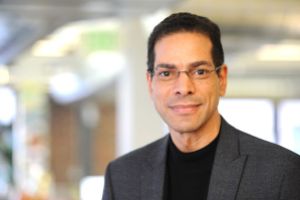“Knowledge is critical for a well-functioning society,” said Wikimedia Foundation Chief of Finance and Administration Garfield Byrd. “The Wikimedia Foundation’s mission is to make available the sum of all human knowledge across the globe, and as a mission-driven individual, that really resonates with me.”

Byrd, a Bay Area native who has worked for various non-profits before he began at the WMF in 2011, feels strongly that a non-profit status is vital to the foundation’s objectives.
“Where the Foundation has initiatives now–the Global South, India, Brazil, Africa, the Middle East–many of these places have been trying to transform the very nature of their government,” he explained. “Those kinds of voices do not need to be represented by multi-billion dollar corporations. They need to be represented with their own voices and with their own knowledge of their culture.”
It’s not as if the WMF, which operates as a 501(c)(3), wouldn’t be worth a considerable amount of money if it were a for-profit organization. Business Insider estimates that the Wikipedia web properties and brand are worth four billion dollars. But Byrd maintains that if you monetize something like Wikipedia or its related projects, you introduce influences over what is appropriate content and who has control over that content.
“We’ve seen this issue with Google and YouTube,” he explained, “where countries in which they are functioning and making money in are saying that if you are generating revenues here, we want to have some say about how you do your business. Conversely, the WMF’s goal is not to generate profits. Our return on investment is for the public good and not for shareholders.”
The WMF supports the Wikimedia websites, but also serves its community of 80,000 active editors, its readers, and its donors. Byrd has been impressed since working here at just how highly transparent the organization is. “I’ve never been a part of an organization that strives for the level of transparency that we do,” he said. “A lot of our information is publicly available and we publish as much as possible for our internal audience… so they know exactly what we’re working on.”
As a part of WMF, Byrd admits that one must get used to the fact that nearly every piece of work you produce is being looked at by someone else and they may be anywhere in the world. Once you get used to it and “in that mode,” he said, it can be a very liberating experience, because you realize you are being honest and open with a large community that shares a common goal.
“We are all committed to one really glorious thing, the support of Wikipedia and its associated projects,” he said. “That’s why the energy at the Foundation is so dynamic. When you dissect that, what makes it interesting is that we’re having a dialogue not just amongst ourselves as staff at WMF, we’re also having an engaged dialogue with the editing community and chapter communities and other volunteers. I think that dialogue is very rich and makes the organization that much stronger.”
When he isn’t working, Byrd loves to explore San Francisco. One of his favorite spots is Yerba Buena Center, a park near the WMF office that he considers one of the most beautiful of its kind.
“The beauty of San Francisco is an undeniable richness that you can’t always find in other urban environments,” he said. “You can interact with a variety of cultures in a city that’s not too big, so it’s a wonderful size to engage, work, and play in. Plus, the public transportation here allows you to be liberated from the tyranny of the car. In fact I took the bus to work today and I walk whenever I get the opportunity. There is a never-ending list of things to do and sights to see, whether you’re running an errand or taking an afternoon for yourself.”
Byrd said that he and his fellow employees at WMF not only have a passion for their work, they also have a passion for the WMF mission—and that synergy is what makes the office environment so special.
“When I go to work I can use my skills to support a project that has a greater good,” he says. “When you are around smart and engaged people day in and day out, you feed off of the energy and that makes it a joy to be here. A colleague said to me once, ‘It’s not a job, it’s a lifestyle.’ I wouldn’t go that far, but it does allow you to feel like you’re contributing to something greater, rather than going to a job and sitting at a desk and doing some routine task.”
Profile by Darrin Fox, Communications Intern
Interviews by Victor Grigas, Visual Storyteller, and Matthew Roth, Global Communications Manager

Can you help us translate this article?
In order for this article to reach as many people as possible we would like your help. Can you translate this article to get the message out?
Start translation